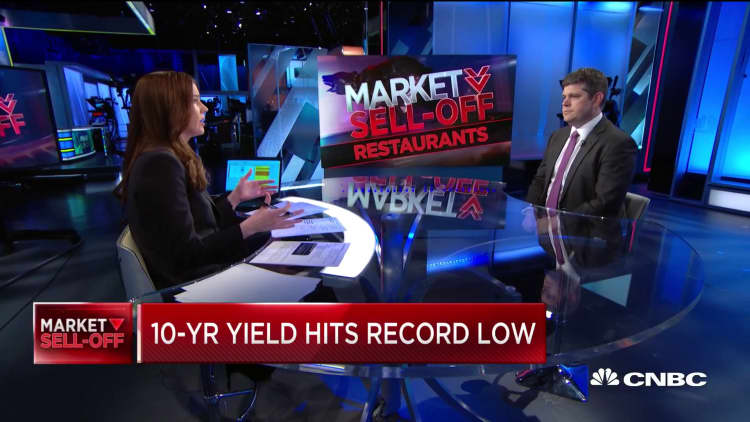Starbucks baristas are washing their hands every 30 minutes. McDonald's employees are cleaning surfaces such as door handles, self-order kiosks and tabletops more frequently. Reusable mugs are no longer an option at Dunkin' or Starbucks cafes.
As the number of confirmed COVID-19 cases in the United States rises, restaurants are stepping up their in-store cleanliness efforts, forming crisis teams and preparing for the worst.
"We are obviously putting money up to support, making sure that our restaurants are staying clean and safe," Dunkin' CFO Katherine Jaspon said Thursday at the UBS Global Consumer and Retail Conference in Boston.
CapitalSpring, a restaurant investment firm with about 4,000 locations nationwide in its portfolio, has sent out detailed instructions to its restaurants, which include Taco Bell and Wendy's franchises.
Some of the firm's directives are unique to the situation, like placing kitchen timers in restaurants and setting them to go off periodically for some time limit under an hour. When the timer dings, employees have to complete a specific cleaning task, like wiping down a cash register or soda station. Tracking sheets and video surveillance make sure that employees are following the stricter policies.
Jim Balis, managing director of CapitalSpring's strategic operations group, said the firm is also providing talking points for employees if a customer or fellow employee appears to exhibit symptoms of the virus.
In a time when labor costs have been pressuring profit margins, restaurants are adding more staff or extending hours to ensure that employees can keep up with increased cleaning efforts. Starbucks, which is sanitizing some areas in the stores as often as every eight minutes, said Thursday it has been scheduling more labor for cleaning.
Hand sanitizer, which has seen its demand spike among consumers, is also being sought by restaurants. McDonald's has sent out guidance to its U.S. restaurants to consider providing hand sanitizer to customers and employees. Dunkin' executives said that the chain has "plenty" of the product but is leveraging its partnerships with companies such as Procter & Gamble to track down more.
February same-store sales, which grew by 0.3% nationally, did not show a hit from the virus, but consumer fears could mean lower restaurant traffic in March, according to industry tracker Black Box Intelligence.
In the case of a wide-scale outbreak in a community, CapitalSpring has plans to shut down dining rooms in restaurants and turn to the drive-thru and delivery.
"We think the drive-thru is ultimately going to be the tightest choke point in terms of food safety and minimizing the spread of the virus as it relates to outside-of-the-home food consumption," said Erik Herrmann, the head of the firm's restaurant investment group.
CapitalSpring's restaurants are also deploying tamper-proof packaging for orders. The measure was in the works even before the outbreak to stop delivery drivers from eating customers' fries, but now carries more significance because third-party delivery drivers have contact with multiple restaurants and consumers.
Consumers are expected to choose food delivery from third-party providers such as DoorDash and Grubhub to avoid contact with restaurant employees and other customers, if the outbreak becomes more widespread.
In China, restaurants such as Yum China's Pizza Hut and KFC offered contactless delivery in locations that remained open, a choice that U.S. eateries could adopt.
Then there's the competition: dining at home. Grocery delivery services such as FreshDirect and Instacart have already reported seeing increased demand.
"We think the existence of aggregators increases the likelihood that consumers will replace restaurant visits with at-home consumption," Bernstein analyst Sara Senatore wrote in a note to clients on Tuesday.



